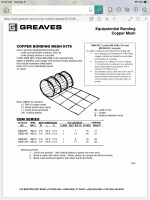We are gut renovating our ~25 year old deck and poo, but I’m getting conflicting advice on how to bond the pool and equipment.
We have a 20’ x 40’ IG vinyl liner pool that sits in a polymer shell, with plastic stairs and swim outs. Within 5’ of the pool there will be new steel handrails, a diving board, grommets for the winter cover and a natural stone deck with a stone coping that overlaps the pool. There is an existing pool pad with Hayward SWG, cartridge filter, VSP, and gas heater.
Previously the old concrete “cool” deck was removed and we had all our lines, skimmers, eyelets and the two lights replaced. Next they are due to dig then place 6-8” of new stone gravel. But they are waiting for the electrician to finish with the bonding before they plan to start (electrician is not supplied by the decking company).
The deck company said we need to install a wire mesh around the pool for bonding if using pavers or stone instead of stamped concrete (I know that’s the case for Gunite pools) but I believe I only need a standard bond wire with my setup since it’s non-conductive. Is that right, or does having natural stone change this?
I’m also questioning if there should be poured concrete under the coping stones instead of packed gravel but maybe that’s a question for another thread.
We have a 20’ x 40’ IG vinyl liner pool that sits in a polymer shell, with plastic stairs and swim outs. Within 5’ of the pool there will be new steel handrails, a diving board, grommets for the winter cover and a natural stone deck with a stone coping that overlaps the pool. There is an existing pool pad with Hayward SWG, cartridge filter, VSP, and gas heater.
Previously the old concrete “cool” deck was removed and we had all our lines, skimmers, eyelets and the two lights replaced. Next they are due to dig then place 6-8” of new stone gravel. But they are waiting for the electrician to finish with the bonding before they plan to start (electrician is not supplied by the decking company).
The deck company said we need to install a wire mesh around the pool for bonding if using pavers or stone instead of stamped concrete (I know that’s the case for Gunite pools) but I believe I only need a standard bond wire with my setup since it’s non-conductive. Is that right, or does having natural stone change this?
I’m also questioning if there should be poured concrete under the coping stones instead of packed gravel but maybe that’s a question for another thread.


